
RVC now aware of 394 cases in the UK.
More than 390 cats in the UK are now known to have contracted feline pancytopenia.
In its latest update, the RVC said that it is aware of 394 cases of the condition, with a mortality rate of 67 per cent. The figures are based on cases treated in RVC’s hospitals and information provided by a small number of vets across the UK.
The RVC notes that the data probably only represents a percentage of cases, as many cats may not be presented to a veterinary practice and/or investigated by a vet.
Veterinary professionals are encouraged to log suspected cases via RVC's online survey.



 The latest
The latest